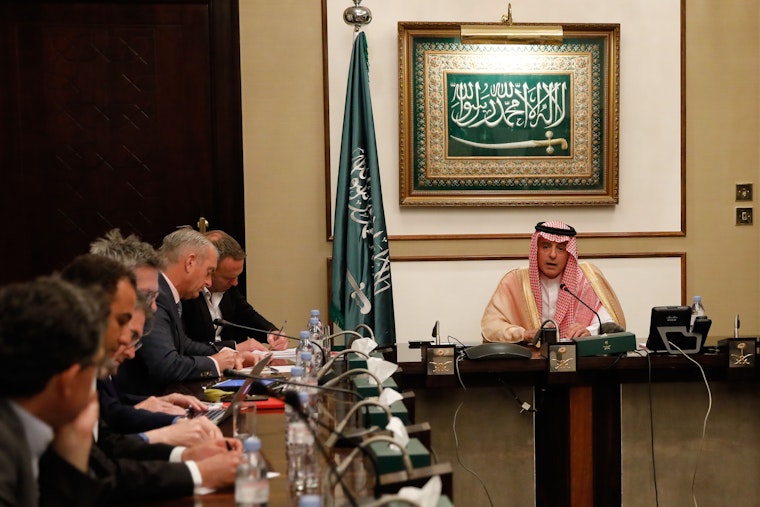UK Should Use “Magnitsky”-Style Sanctions to Hold MBS Accountable for Khashoggi’s Killing
By Aidan Harris & Jana Sadler-Forster

Earlier this year, under its Global Human Rights Sanctions Regulations, the UK froze financial assets and imposed travel restrictions on twenty Saudi nationals involved in Washington Post journalist Jamal Khashoggi’s 2018 murder in a Saudi consulate. When Foreign Secretary Dominic Raab unveiled the long-awaited “Magnitsky”-style human rights sanctions regime in July, he expressed hope that the new laws would make it “crystal clear to those who abuse their power to inflict unimaginable suffering that we won’t look the other way.”
However, there remains one glaring omission from the current list of Saudi names: Saudi Crown Prince Mohammed bin-Salman himself. Information released so far about the crown prince’s involvement in Khashoggi’s assassination has been damning. After being briefed on the CIA report, then-Senator and Chair of the U.S. Senate Foreign Relations Committee Bob Corker commented: “If the crown prince went in front of a jury, he would be convicted in 30 minutes.” UN Special Rapporteur Agnes Callamard has said that there is sufficient credible evidence regarding the crown prince’s responsibility for Khashoggi’s “pre-meditated execution” to demand further investigation. Chillingly, on a recording of the killing collected by Turkish intelligence, the hit team’s leader, Maher Abdulaziz Mutreb, placed a call to someone who American intelligence agencies believe to be his superior, crown prince advisor Saud al-Qahtani. “Tell your boss,” he said, in what is believed to be a reference to the Saudi crown prince, "The deed is done." Mutreb was inside the Saudi consulate as Khashoggi was drugged, suffocated and dismembered. The sanctions list's exclusion of the crown prince, who the CIA has reportedly concluded with “medium-to-high confidence” personally targeted Khashoggi and probably ordered his death, calls into question the seriousness of the UK’s intention to hold the world’s worst human rights abusers accountable.
In fact, when it comes to its relations with the Saudi regime, the UK government has continued to say one thing but do another. Just a day after its new global human rights regime was announced, the UK defence secretary reportedly telephoned his Saudi counterpart to apologize for targeting Saudis under the sanctions and to privately praise the regime. The government also renewed arms export licenses for British weapons to be sold to Riyadh, even though it found there to be possible breaches of international law by Saudi forces in Yemen.
The response of other world leaders has been just as muted, and despite global outrage around Khashoggi’s assassination, Mohammed bin-Salman continues to enjoy impunity around the world. Just nine months after Jamal’s murder, the crown prince took centre stage at the G20 Summit in Japan, as dignitaries gathered around and posed for photos. He continues to be feted by Western governments as a leader in waiting, thanks, in part, to his close ties with the White House. The Trump administration has repeatedly flaunted its legal obligations to prevent Congress from receiving information on the Khashoggi case, including an unclassified report identifying anyone implicated in “the directing, ordering or tampering of evidence” in the case of Khashoggi. The upcoming November G20 Summit, which Saudi Arabia will host, presents yet another occasion to rehabilitate the crown prince’s reputation among the world’s most powerful.
Yet this is despite mounting grounds to suspect that Khashoggi’s murder was not an isolated event, but part of a carefully planned strategy by Mohammed bin-Salman and close associates to deal with individuals who could cause embarrassment and undermine his authority. Shortly after his accession in 2017, the crown prince reportedly assembled an elite team of fifty specialists tasked with eliminating Saudi critics living around the globe. Documents filed in a U.S. court just last month allege that the crown prince dispatched this group to Toronto, Canada, in a failed attempt to assassinate his former intelligence chief, Saad al-Jabri, only weeks after Khashoggi’s death.
If the UK is really committed, as it claims, to the “long struggle against impunity for the worst human rights violations,” it must target those at the top, not just those carrying out orders. That's why, this week, the Open Society Justice Initiative made a submission calling for the UK government to use its new powers to impose human rights sanctions on the crown prince, on the basis that there are reasonable grounds to suspect that he constitutes an “involved person” in Khashoggi’s killing. Absent a persuasive explanation, the failure to designate Mohammed Bin Salman while naming 20 lower ranking officials sends a profoundly concerning message about the UK’s willingness to tolerate abuses in order to appease its political allies. As long as the UK continues to look the other way while these individuals with get away with murder, it will be complicit in the egregious human rights violations that its own laws seek to punish.
Aidan Harris is a program officer for the Open Society Justice Initiative.
